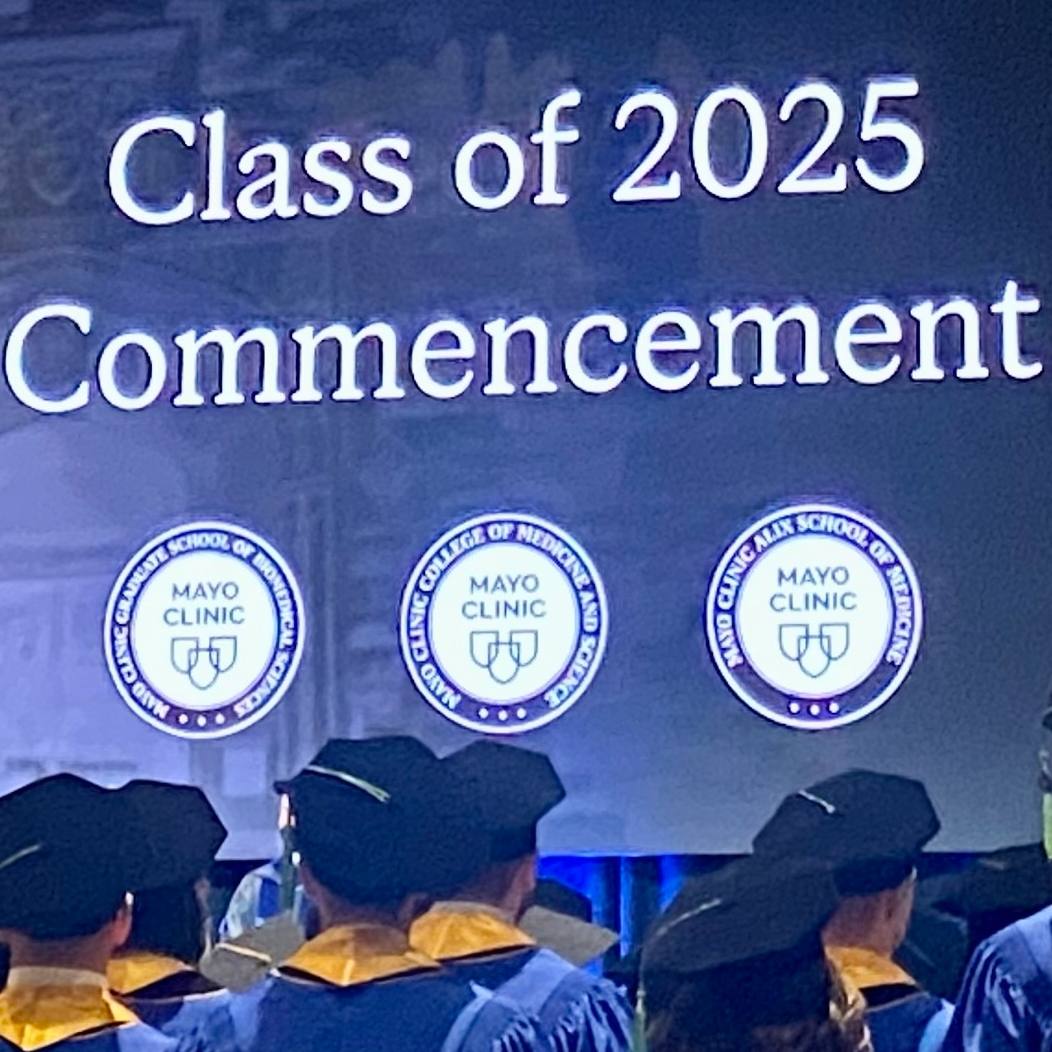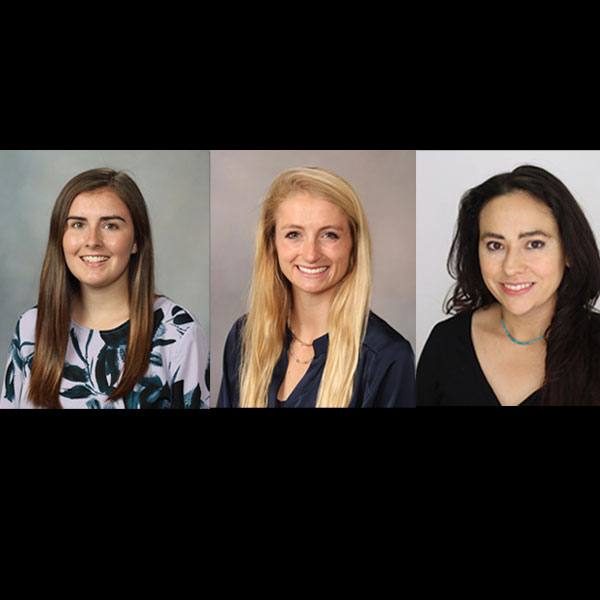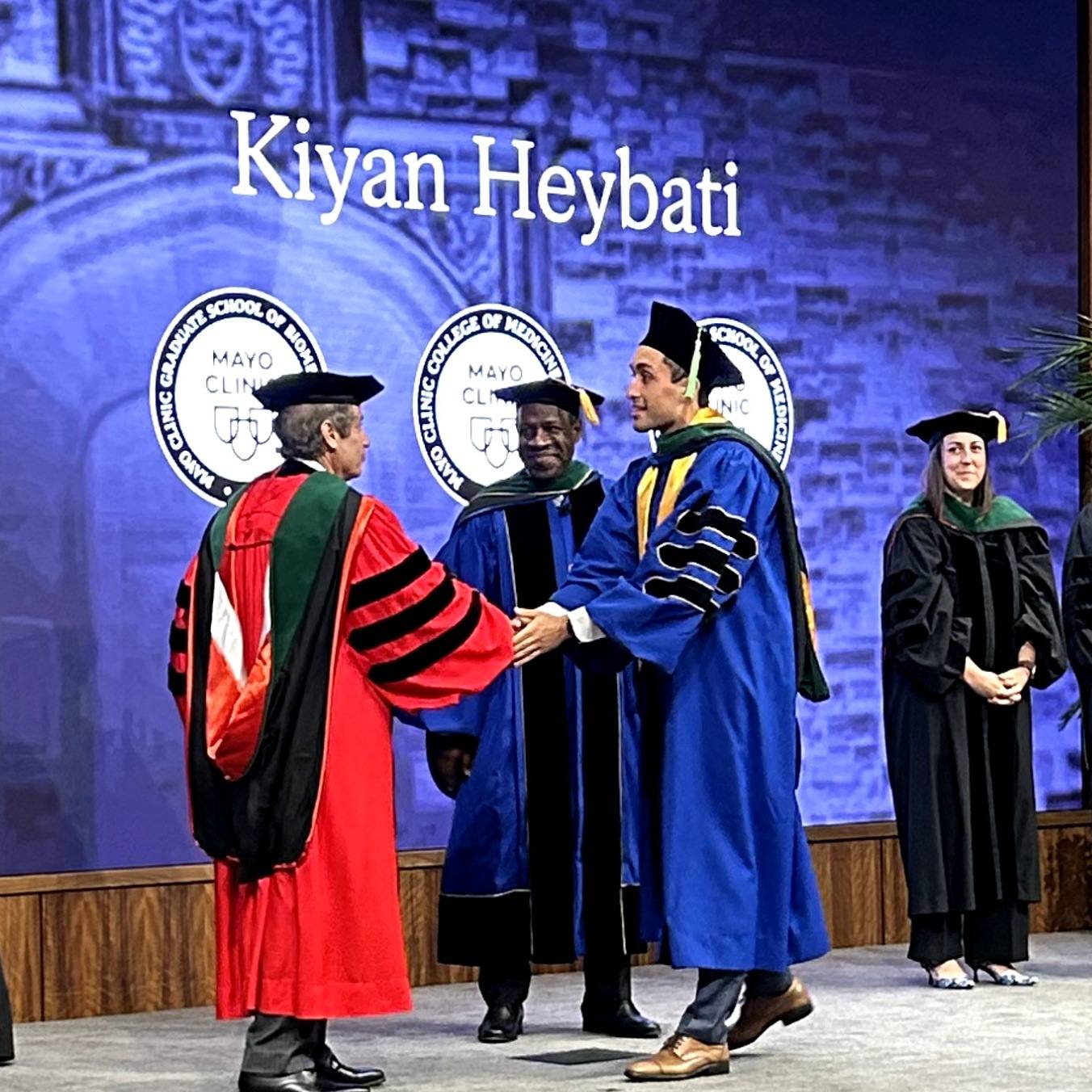-
Science Saturday: Patients who make research happen
Neuroscientist Tania Gendron, Ph.D. was in her lab on Mayo Clinic’s Florida campus when she received a phone call. On the line was a neurologist saying a patient had requested to meet her. It was an unusual request.
“I’m not a clinician, and my work is in the lab,” Dr. Gendron says. “As scientists, we almost never have occasion to interact with patients.”
The patient, Sandra Murphy-Pak of Gainesville, Florida, had been donating her spinal fluid to a Mayo research study on Lou Gehrig's disease, which also is known as amyotrophic lateral sclerosis or ALS. As a person with ALS, Murphy-Pak knows the study’s results might not help her symptoms, but she feels like being part of a study is an important contribution.

“I was eager to take action,” Murphy-Pak says. “Research is the machine behind finding cures.”
Murphy-Pak is one of thousands of Mayo Clinic patients each year who donate the tissues, fluids, cells and biological material needed for research. Some patients donate these biosamples for specific studies into a particular disease. Others donate to a research repository, such as the Mayo Clinic Biobank, containing over 50,000 patient samples from Mayo Clinic’s three campuses.
Those donations are helping Mayo scientists understand the molecular origins of disease and identify genetic variations that can help diagnose individual patients. They’re also helping to discover potential targets for drugs.
“As researchers, we’re so thankful to those patients who enroll in research studies,” Dr. Gendron says. “We’re in this field because we want to help cure disease, but our work wouldn’t be possible without them.”
So when Murphy-Pak requested a meeting, Dr. Gendron says, “I walked over to the clinic with our most recent published paper in hand to show her what we’re doing.”
Proteins That May Speed Clinical Trials for ALS
Dr. Gendron’s work in ALS builds on a recent discovery: an unusual genetic mutation, C9orf72, that causes thousands of repeated sequences within the genetic code.

The mutation has been found to occur in nearly 40 percent of all familial cases and 10 percent of sporadic cases of ALS. It also occurs in 5 to 10 percent of people with frontotemporal dementia, a related neurodegenerative disorder. Now, several neuroscience labs on the Florida campus are studying the C9orf72 mutation and how it causes ALS or frontotemporal dementia.
After Murphy-Pak was diagnosed, a blood test showed she carries the mutation. Though she was taking in the severity of her diagnosis, she was glad to help in the study of a disease that has no effective treatments. She didn’t mind giving spinal fluid every few months, which she says seemed intimidating at first but turned out to be painless.
The Discoveries
Dr. Gendron, along with neuroscience chair Leonard Petrucelli, Ph.D., and emeritus neurologist Kevin Boylan, M.D., are investigating the proteins in spinal fluid to determine if they can help guide treatment. In a paper in Science Translational Medicine, the team reported on one protein linked to neuron treatment with drugs, and another protein linked to progression of neurodegeneration.
“It’s very important to have biomarkers for disease processes, that is molecules we can look at to determine the severity of disease and to help patients understand their prognosis,” she says. As new drugs come up for testing, the proteins the team is investigating will be tools to streamline and expedite clinical studies.

Lessons Learned From Grandma
Neuroscientist Melissa Murray, Ph.D., had long been interested in studying the brain, but her motivation intensified during graduate school at Mayo Clinic. At that point, her grandmother, with whom she had a strong and loving relationship, developed dementia.

“It was like rocket fuel for me,” she says of the passion she developed for understanding and finding a cure for Alzheimer’s disease. The motivation continued and grew as her research progressed because of her personal connection with the condition. After her grandmother died, Dr. Murray helped coordinate the donation of her grandmother’s brain to Mayo Clinic’s brain bank, a research repository on the Florida campus.
“For family members, having a definitive diagnosis can provide a sense of closure,” says neuropathologist Dennis Dickson, M.D., who directs the brain bank.
As it turned out, her grandmother’s brain samples contributed directly to Dr. Murray’s research, leading to a paper published in Lancet Neurology titled, "The Identification of Three Distinct Subtypes of Alzheimer’s Distinguished by Where in the Brain Protein Tangles Clump."
As the opportunities improve for earlier diagnosis, this finding may eventually individualize treatment for patients with each subtype.
Dr. Murray has gone on to clarify distinguishing details of the disease, focusing on the prevalence and characteristics of Alzheimer’s in distinct ethno-racial groups. When donating brain tissue as part of advance planning, patients fill out questionnaires about their family histories, education, age of disease onset, and ethno-racial identity.
“If we don’t know about patients’ lives, then we can’t understand how the changes we see under the microscope relate back to the life of the individual,” Dr. Murray says. In a recent study, her team found Hispanic-American patients tend to develop Alzheimer’s symptoms younger than white Americans, but they tend to survive longer with the disease.
“We don’t know right now if there are protective factors or if the difference is the network of family care. These are questions I hope to start investigating,” Dr. Murray says. The finding was possible, she says, because the brain bank contains 67 samples from patients with Alzheimer’s who also self-identified as Hispanic. “Some diseases and some ethno-racial groups tend to be underrepresented in brain banks. Donation is, of course, a sensitive topic that requires a lot of cultural and personal sensitivity. Our hope is that families will continue to find out more about the meaningful advances that can come of it,” she says.
Eager to Donate to a Greater Good
Ten years ago, breast cancer surgeon Sarah McLaughlin, M.D., began thinking about the painful, persistent arm swelling called lymphedema that affects some patients after lymph node removal surgery.

She began wondering why only some women develop lymphedema and whether it’s possible to predict those at risk. Interested in establishing a long-term resource on the Florida campus , she began asking her patients if they wanted to donate samples of their tumors and blood to a new breast cancer and lymphedema registry.
According to published studies, women with breast cancer tend to be among the most eager to donate samples, and Dr. McLaughlin has seen that intensity in her patients.
“They’re almost unanimously willing to contribute. Even in a moment that they’re making important decisions for themselves, they’re often very committed to giving to what they see as a greater good,” she says.
Today, Dr. McLaughlin's breast tumor registry contains tumor, tissue, blood and quality of life information from more than 1,000 women and is comparable to registries on Mayo’s Rochester and Arizona campuses. It is yielding important information about lymphedema, and Dr. McLaughlin’s team is continuing to look for inflammatory markers that will help predict how patients are going to fare after surgery.
“What we’re learning is that lymphedema is more likely a combination of factors, including women’s anatomy, the environment of the tumor and immunologic factors,” she says.
These findings likely will provide valuable guidance regarding postsurgery therapies for women who are at risk.
Gathering Fat to Treat Brain Tumors
A scientist who studies brain tumors, Hugo Guerrero-Cazares, M.D., Ph.D., walks a careful line when it comes to biosamples.

His work, in collaboration with neurosurgeon Alfredo Quinones-Hinojosa, M.D., the William J. and Charles H. Mayo Professor, on Mayo Clinic’s Florida campus includes studying aggressive cancers, such as glioblastomas. There is no cure for glioblastoma.
“The treatment plan for our patients is not affected by their decision to donate tissue,” Dr. Guerrero-Cazares says. “Our patients are aware that, unfortunately, due to the aggressiveness of their disease, current research will likely progress too slowly to help them, and we need to make sure we don’t create false expectations. However, the patients who want to participate understand and wish that their contribution to science will help future patients down the road.”
Donated brain tumor cells already have paved the way for important findings about how tumors invade the brain and why some tumors are more aggressive than others.
Dr. Guerrero-Cazares has given tours of the science lab to family members who were thrilled to see a loved one’s cells still thriving and were glad something more had come of the donation to fight the disease. “We keep a close relationship with many of the patients and their families when they become interested in the research and they want to know more about what we’re doing,” he says.
“Those conversations are important for them, and they always hit home for us, too. They remind us we’re not just doing science because we love science, but because it makes a difference.”
-- Kate Ledger







